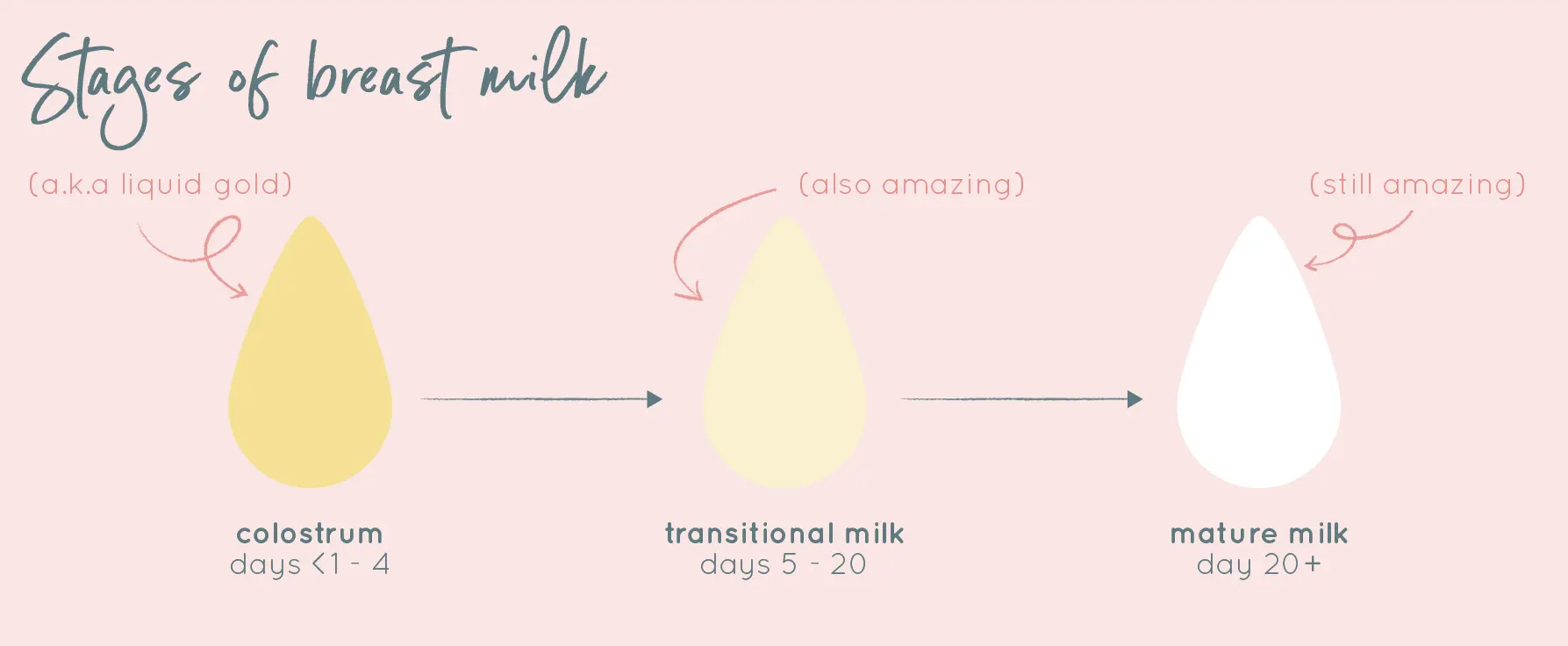Home
Pregnancy & Breastfeeding Tips for New Moms: Preconception, Pumping & Parenting Support
What Is Colostrum? Is Colostrum Good for the Baby?

What Is Colostrum? Is Colostrum Good for the Baby?
If you’re a breastfeeding mom or you’re pregnant and you’re planning to breastfeed, you’ve likely already heard the word “colostrum,” but what is colostrum and are there any colostrum benefits for a baby? The more you know about colostrum, the more impressed you’ll be, and the happier you’ll be that you chose to breastfeed in the first place.
What is Colostrum and What Does It Do?
When you give birth, it isn’t breast milk that you have but instead, colostrum. It takes roughly two to three days on average for actual breast milk to come in, but in the meantime you will be feeding the baby colostrum. Colostrum is much thicker than breast milk and is usually yellowish in color, although it can also be a creamy white instead, but these things aren’t what make colostrum so special.
Once you learn what kind of nutrients are in colostrum, you’ll understand why it’s so valuable. Above all else, colostrum has tons of antibodies and antioxidants that strengthen the baby’s immune system. When babies are born their immune systems are very vulnerable, and colostrum helps strengthen their immune systems so they can more easily fight off dangerous organisms.
Colostrum also contains proteins such as lactoferrins, which further strengthen their immune systems, and is low in fat and sugar. It also contains vitamins such as vitamin A and minerals that include magnesium, zinc, and copper. This makes colostrum good for the baby’s immunity, skin health, vision, and their bone and heart health. In many ways, colostrum makes a perfect food for newborns.
So if you’ve ever wondered, is colostrum good for a baby, the answer is a resounding “yes.” Colostrum offers benefits that baby formula doesn’t offer; in particular, the antibodies that make their immune system strong and keep it strong for the rest of their lives.
Other Benefits of Colostrum
In addition to the advantages already mentioned, the other benefits of colostrum include:
- It can improve the gut help of the baby, thanks in part to its low fat content
- It can help regulate the baby’s metabolism, blood sugar levels, body temperature, and lung and circulatory functions
- It helps the baby grow properly, which is especially good for premature infants
- It can act as a natural laxative, clearing out the initial poop (meconium) from the baby’s body and lowering the risks of getting jaundice
When you take a look at everything colostrum does for your baby, it becomes obvious that this is a food that only nature can manufacture. It is, quite literally, the perfect first food for a newborn.
From Colostrum to Breast Milk
While only colostrum is expressed in the first several days after giving birth, it does eventually transition to breast milk, and here is the process involved:
- Colostrum is made by the body for up to five days after you give birth. After around five days, it starts to change. Colostrum is thicker than breast milk but is still easy to consume by the baby.
- Transitional milk starts to come in five to fourteen days after you give birth. It is a mixture of colostrum and regular breast milk, and at this point, your breasts will be much fuller and maybe even more tender, in part because the milk is coming in at a faster rate to accommodate the baby’s nutritional needs.
- Breast milk usually arrives four to six weeks after you give birth. The milk is thinner and whiter because there is no colostrum in it, and it also has more sugar and fat because that’s what the baby needs at this point.
Pre-Birth Collection of Colostrum
A lot of people don’t realize that roughly half-way through your pregnancy, your body will start producing colostrum. In fact, if your breasts are leaking starting at around 16 to 20 weeks, you can collect this colostrum and save it for after the baby is born.
Some of the reasons why pregnant women decide to collect colostrum while they’re pregnant include:
- Your supply of breast milk in the past has been low
- You’re leaking a lot during pregnancy
- Your previous babies are large or you have gestational diabetes, which sometimes means your blood sugar is low
- You have a C-section planned, which can inhibit your production of milk in the first few days
- Your baby has a cleft palate or lip and may find it difficult to nurse
- You have breast implants, which sometimes affects your milk supply
If you’re wondering when to start collecting colostrum, keep two things in mind: once you start leaking, you can start to collect colostrum at any time; also, if you haven’t been leaking but wish to collect colostrum, talk to your doctor about collecting it at 36 weeks of pregnancy. Asking yourself, when can I start collecting colostrum, has two simple answers.
One more thing: if you never leak while you’re pregnant, this does not mean something is wrong. In addition, there are actually colostrum collection kits available that can make the task a lot easier and faster. You can look for them online.
Conclusion
So, we’ve answered a few questions here about colostrum, including what is colostrum and why is colostrum important, which means deciding whether or not to collect colostrum while you’re pregnant is now an easier decision to make. Indeed, the colostrum that is there as soon as you give birth strengthens the baby’s immune system and gives them a great start on life. It is a very important ingredient in breast milk that does the baby a world of good.
Share


